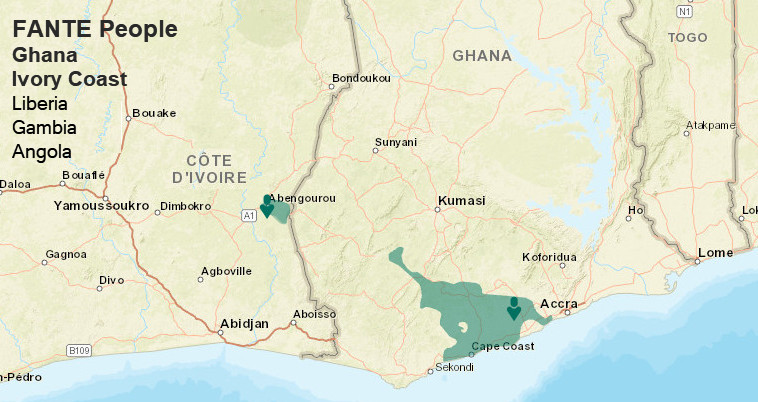
Source: Last Tribe 101
Fante, also known as Mfantse or Fanti, is a stable language spoken in Ghana. The language is one of the principal Akan dialects and belongs to the bigger Kwa language group, also from the bigger Niger-Congo language family (Ethnologue, 2019 Ed.).
Fante is also spoken in the Ivory Coast, Liberia, Angola, The Gambia as well as some coastal African countries (Ethnologue, 2022 Ed.). In Ghana, Fante is primarily spoken in Central and Western Region. It is also spoken in Tema in the Greater Accra Region.
As a prominent member of the largest and most widely spoken language and ethnic group in Ghana, it is estimated that as at 2013, there were approximately 2.8 million native speakers of Fantes (Ethnologue, 20122 Ed.). It is now estimated that Fantes are 6 million.
Etymologically, the term “Fante” is said to emanate from “Fa atsew”, meaning the half that separated from the ancient Akans that settled at Krakow, present day Techiman. Fantes custom of eating cabbage “fan” also gave them the name Fante.
Notable speakers include Dr. Kwame Nkrumah, John Fiifi Atta Mills, Kofi Kinaata, Kofi Annan, Paa Kwesi Amissah Arthur, Cardinal Peter Appiah Turkson, Jane Naana Opoku-Agyemang, Paapa Yankson, A.B. Crentsil, Nana Aba Anamoah, Lydia Forson, Yvonne Nelson, Professor Charles Owu-Ewie, Efuwa T. Sutherland, Ama Atta Aidoo, etc.
Fante is mutually intelligible to the other principal dialects of Akan namely Asante, Akuapem and Bono, collectively called as Twi. With this, there are controversies among scholars and language lovers as to why Fante isn’t considered a Twi dialect. The controversy was spearheaded by the renowned Akan scholar J. G. Christaller, who advocated for labeling all the principal dialects of Akan as “Twi.” His motivation was to enhance the prestige and economic value of both his Dictionary and Grammar by consolidating them under a single, more recognizable term, as noted by Dolphyne (1975).
As soon as Christaller made such move, it was not accepted by some Fante scholars and speakers as they considered Twi to include the dialects of Asante, Akuapem, Bono, Akyem, Kwahu, Wassa, etc. (Dolphyne, ibid.). Akan scholars like Westerman & Bryan (1952); Boadi (2009); Abakah (2012, 2013, 2016); Adomako (2017); Odoom & Adomako (2018); Dolphyne (2006), etc. classify none-Mfantse Akan dialects as Twi, supporting the claim that Fante is indeed not a Twi dialect.
As discussed in the Linguistics literature, a dialect is a continuum of language. Fante is not classified as a Twi dialect because Fante itself has 5 principal dialects namely Boka, Iguae, Anee, Breman and Agona (Abakah, 2016). The question remains how can a dialect give rise to dialects? Based on the classification of Fante dialects by Abakah (ibid.), a new controversy has arisen among Akan scholars, suggesting that Fante itself may be considered a distinct language within the broader Akan language family.
Fante is considered by Ghanaian language lovers as the most ‘sexiest’ language. It is also known for its English code switching and code mixing, to the extent it has generated a famous term “Mfantsefo na Borɔfo a”, meaning “Fantes and English language”.
Phonologically, Fante is renowned for its distinctive features, including the use of affrication and velar palatals such as /dz/ and /ts/, etc., which add a unique flair and intensity to its pronunciation. Additionally, Fante is characterized by its adherence to vowel harmony, a linguistic phenomenon that further enhances its melodic and rhythmic qualities, contributing to its “sexiness”. Anthropologically, Fantes are considered as the home of Festivals in Ghana. They house the famous Takoradi Masquerade festival, Oguaa Fetu festival, Akwambɔ, Dena Bakatue, Ahobaa, etc.
Academically, Fante is studied from the basic level to the tertiary level. At the tertiary level, it belongs to the Department of Akan-Nzema Education at UEW-Ajumako Campus and it is studied up to the PhD level. The language also has numerous contents supporting its vitality and stability. It includes Radio and TV stations, newspapers, online articles and news, offline and online Bibles, Mormon, movies and series, contents, keyboards, etc. It is also live on Wikipedia and Khaya app.
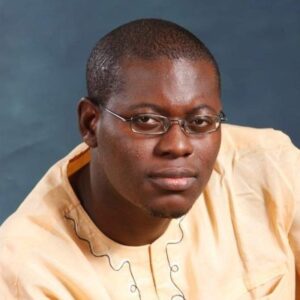
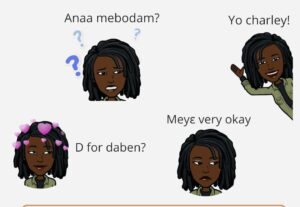
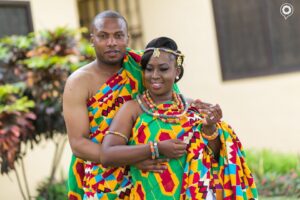
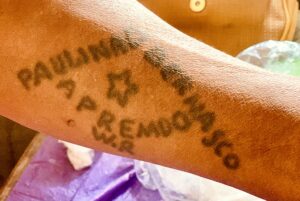
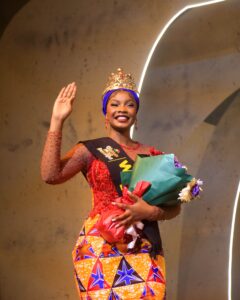

Insightful 🔥💯
Thank you Sir
Insightful 💯🔥
Very educative
Nice one